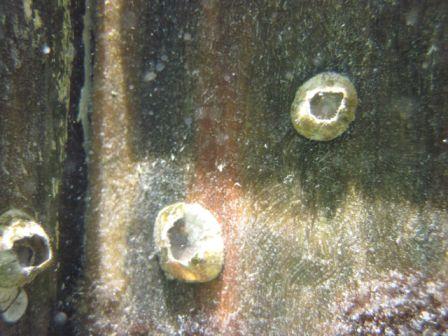
One of the most aggravating nemeses to those having to keep their boats in a salt water environment is the dreaded barnacle. A barnacle is a type of arthropod that is related to crabs and lobsters.
Barnacles are exclusively marine. They therefore tend to live in shallow and tidal waters.. They are sessile suspension feeders, and have two nektonic (marine and freshwater organisms that can swim freely and are generally independent of currents) larval stages. Around 1,220 barnacle species are currently known.
Most barnacles are suspension feeders; they dwell continually in their shell, which is usually constructed of six plates and reach into the water column with modified legs. These feathery appendages beat rhythmically to draw plankton and detritus into the shell for consumption.
 Photo by Rick Adaamovic of Port Orange
Photo by Rick Adaamovic of Port Orange
Here is an underwater photo of three barnacles on a piling in the Florida Keys.
Although they have been found at water depths up to 2,000 feet, most barnacles inhabit shallow waters, with 75% of species living in water depths of less than 300 feet and 25% inhabiting the intertidal zone.
Since the intertidal zone periodically desiccates, barnacles are well adapted against water loss. Their calcite shells are impermeable, and they possess two plates which they can slide across their aperture when not feeding. These plates also protect against predation.
Barnacles and limpets compete for space in the intertidal zone. Barnacles are displaced by limpets and mussels, who compete for space. They also have numerous predators.
Among the most common predators on barnacles are some sea snails a.k.a. whelks, mostly found in temperate and tropical waters. They are able to grind through the calcareous exoskeletons of barnacles and feed on the softer inside parts. Mussels also prey on barnacle larvae.
Fishing Report
- In the surf and on the piers, anglers are landing a lot of pompano, large bluefish, ladyfish and numerous sharks. In the inlet, there have been good catches of flounder near the Coast Guard station, in the Halifax River and the Tomoka basin and the jetties.
- Redfish are crowding up in the flats between George’s bar and Edgewater.
- Offshore, according to Capt. Fred Robert, there have been large schools of Spanish mackerel and Bonita. Some cobia are being caught. There have also been reports of dolphin, sailfish, wahoo, and blackfin tuna.
- With the falling water emperatures, we ought to see more tarpon, cobia and rays.
Update on snapper bans
A permanent federal ban on fishing red snapper in the South Atlantic and a ban on fishing other snapper and grouper species off north Florida is imminent.
The controversial fishing regulations, which federal officials say are required to save red snapper, passed a key hurdle Wednesday and could take effect in December, once Commerce Secretary Gary Locke signs off on them.
A temporary red snapper fishing ban has been in effect since January, driven by a federal study finding that snapper is being overfished in the South Atlantic. To protect red snapper from being accidentally caught, the expanded regulations would bar fishing more than 70 other snapper or grouper species off the north and Central Florida coast. Fishermen, both recreational and commercial, are opposed to the bans, saying that the red snapper population is strong and that restrictions will devastate the fishing industry. A recreational fishing group has a pending federal lawsuit.
"Once this takes effect, you can say goodbye to the local fishing fleet," said Russell Hudson, president of Directed Sustainable Fisheries Inc., and a lobbyist for commercial fishermen. "There will not be a whole lot of fishermen left standing."
An environmental group hailed the upcoming restrictions, calling them necessary to save red snapper and to balance the ocean ecosystem.
"This plan puts South Atlantic red snapper on the right track for recovery, and it is long overdue," said Holly Binns, manager of the Pew Environment Group's Campaign to End Overfishing in the Southeast. "This iconic species has been fished at unsustainable rates for decades, and this decisive action is required now to save it."
It's unclear how long the bans will last, but the plan could be in effect for 35 years.
Capt. Budd's PostScript
It has been written “Bragging may not bring happiness, but no man having caught a large fish goes home through the alley."
So whether you charter, ride a head boat, run your own vessel, stay in the river, surf fish, or fish from shore or a bridge, there are fish to be caught. Fishing is not a matter of life or death, it is so much more important than that.
Tight lines, Capt. Budd
NSBNEWS.net and VolusiaNews.net provide 24/7 online-media coverage for a 21st-century world
